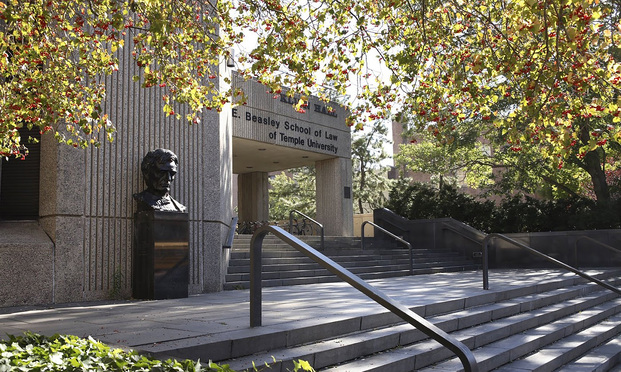Temple Law School Proposes Tuition Freeze Amid COVID-19
The university board of trustees is set to vote on the proposal Tuesday.
May 11, 2020 at 05:54 PM
4 minute read
 Klein Hall at Temple University Beasley School of Law in Philadelphia.
Klein Hall at Temple University Beasley School of Law in Philadelphia.
The Temple University Beasley School of Law is proposing a tuition freeze in response to the financial pressures created for students by the coronavirus pandemic.
Greg Mandel, the law school's dean, said in an interview Monday that he has proposed to the university's board of trustees that the law school should keep tuition the same as it was for the current academic year, for both incoming and continuing students, instead of implementing the usual increase—about 3% each year.
The board is set to vote on the proposal Tuesday, Mandel said.
Asked whether this is a unique measure, he said he does not remember the last time the law school froze tuition.
"It's an unusual measure for the law school," Mandel said. "The university president has also proposed tuition freezes for undergrad as well, obviously thinking along the same lines. Even though these are challenging financial times for universities, we recognize that some of our students are in even more difficult financial straits."
For the current academic year, tuition for full-time students who are residents of Pennsylvania was $25,980. For nonresidents it was $41,354.
Mandel said the law school has also aimed to raise funds and give grants to students who need additional financial support because of the pandemic. Its student emergency assistance fund raised more than $50,000, and has already given more than 60 grants, he said. He noted that the school has also chosen not to withdraw any merit scholarships this year for students whose grades do not meet the usual minimum requirements.
"We had students who had lost their jobs as a result of the coronavirus crisis, and those outside jobs were how they were affording to put food on their shelves to eat," Mandel said. He noted that more than 80% of Temple's law students have some financial need, as defined by federal guidelines, and more than 40% have full financial need.
"We have students who come from a wide variety of backgrounds. They're in an equally wide variety of situations right now," he said.
The virus, and resulting economic pressures, have caused many businesses, including law firms, to find cost reduction opportunities. For some firms, that has included canceling or shortening summer associate programs, and some of those adjustments have also cut the amount of money those summer associates would have received.
Still, Mandel noted that a lot of the law firms that recruited summer associates from Temple are continuing to hold their summer programs—many remotely—and have pledged to still pay summers. He noted that a lot of students rely on those jobs, as well as part-time work during the school year, to help pay for tuition.
Law schools have also not been immune to the economic conditions, facing their own budget shortfalls. Schools including Harvard University, the University of Arizona and University of Michigan have announced measures such as hiring freezes and pay cuts for certain employees.
Asked about such measures, Mandel said Temple has announced a hiring freeze and salary cuts for administrators making over $100,000.
"The law school already tries to run a very lean operation in order to keep tuition as low as possible for students. We are looking for additional ways to control expenses in these times, but do not expect to make any cuts that would affect students or the high quality of the education that they receive," he said.
Read More
Law Schools Hit by Financial Fallout From COVID-19
Big Tuition Hikes Loom at University of California's 4 Law Schools
This content has been archived. It is available through our partners, LexisNexis® and Bloomberg Law.
To view this content, please continue to their sites.
Not a Lexis Subscriber?
Subscribe Now
Not a Bloomberg Law Subscriber?
Subscribe Now
NOT FOR REPRINT
© 2025 ALM Global, LLC, All Rights Reserved. Request academic re-use from www.copyright.com. All other uses, submit a request to [email protected]. For more information visit Asset & Logo Licensing.
You Might Like
View All
Pennsylvania Law Schools Are Seeing Double-Digit Boosts in 2025 Applications
5 minute read
Sanctioned Penn Law Professor Amy Wax Sues University, Alleging Discrimination
5 minute read
Pa. Superior Court: Sorority's Interview Notes Not Shielded From Discovery in Lawsuit Over Student's Death
3 minute read
LSAT Administrator Sues to Block AI Tutor From Using ‘Famous, Distinctive’ Test Prep Materials
3 minute readTrending Stories
- 1Uber Files RICO Suit Against Plaintiff-Side Firms Alleging Fraudulent Injury Claims
- 2The Law Firm Disrupted: Scrutinizing the Elephant More Than the Mouse
- 3Inherent Diminished Value Damages Unavailable to 3rd-Party Claimants, Court Says
- 4Pa. Defense Firm Sued by Client Over Ex-Eagles Player's $43.5M Med Mal Win
- 5Losses Mount at Morris Manning, but Departing Ex-Chair Stays Bullish About His Old Firm's Future
Who Got The Work
J. Brugh Lower of Gibbons has entered an appearance for industrial equipment supplier Devco Corporation in a pending trademark infringement lawsuit. The suit, accusing the defendant of selling knock-off Graco products, was filed Dec. 18 in New Jersey District Court by Rivkin Radler on behalf of Graco Inc. and Graco Minnesota. The case, assigned to U.S. District Judge Zahid N. Quraishi, is 3:24-cv-11294, Graco Inc. et al v. Devco Corporation.
Who Got The Work
Rebecca Maller-Stein and Kent A. Yalowitz of Arnold & Porter Kaye Scholer have entered their appearances for Hanaco Venture Capital and its executives, Lior Prosor and David Frankel, in a pending securities lawsuit. The action, filed on Dec. 24 in New York Southern District Court by Zell, Aron & Co. on behalf of Goldeneye Advisors, accuses the defendants of negligently and fraudulently managing the plaintiff's $1 million investment. The case, assigned to U.S. District Judge Vernon S. Broderick, is 1:24-cv-09918, Goldeneye Advisors, LLC v. Hanaco Venture Capital, Ltd. et al.
Who Got The Work
Attorneys from A&O Shearman has stepped in as defense counsel for Toronto-Dominion Bank and other defendants in a pending securities class action. The suit, filed Dec. 11 in New York Southern District Court by Bleichmar Fonti & Auld, accuses the defendants of concealing the bank's 'pervasive' deficiencies in regards to its compliance with the Bank Secrecy Act and the quality of its anti-money laundering controls. The case, assigned to U.S. District Judge Arun Subramanian, is 1:24-cv-09445, Gonzalez v. The Toronto-Dominion Bank et al.
Who Got The Work
Crown Castle International, a Pennsylvania company providing shared communications infrastructure, has turned to Luke D. Wolf of Gordon Rees Scully Mansukhani to fend off a pending breach-of-contract lawsuit. The court action, filed Nov. 25 in Michigan Eastern District Court by Hooper Hathaway PC on behalf of The Town Residences LLC, accuses Crown Castle of failing to transfer approximately $30,000 in utility payments from T-Mobile in breach of a roof-top lease and assignment agreement. The case, assigned to U.S. District Judge Susan K. Declercq, is 2:24-cv-13131, The Town Residences LLC v. T-Mobile US, Inc. et al.
Who Got The Work
Wilfred P. Coronato and Daniel M. Schwartz of McCarter & English have stepped in as defense counsel to Electrolux Home Products Inc. in a pending product liability lawsuit. The court action, filed Nov. 26 in New York Eastern District Court by Poulos Lopiccolo PC and Nagel Rice LLP on behalf of David Stern, alleges that the defendant's refrigerators’ drawers and shelving repeatedly break and fall apart within months after purchase. The case, assigned to U.S. District Judge Joan M. Azrack, is 2:24-cv-08204, Stern v. Electrolux Home Products, Inc.
Featured Firms
Law Offices of Gary Martin Hays & Associates, P.C.
(470) 294-1674
Law Offices of Mark E. Salomone
(857) 444-6468
Smith & Hassler
(713) 739-1250





